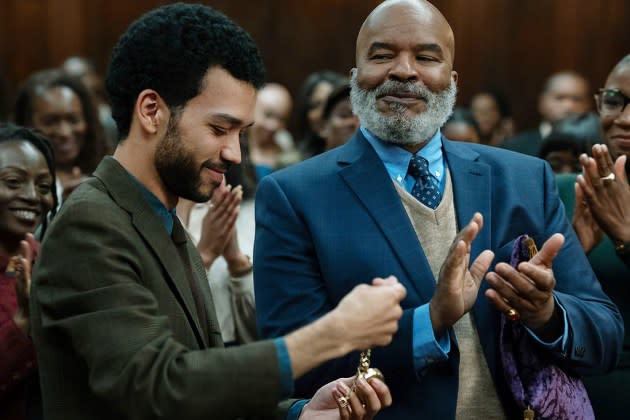‘The American Society of Magical Negroes’ Review: Justice Smith and David Alan Grier Star in a Satire Suffering From an Identity Crisis
- Oops!Something went wrong.Please try again later.
- Oops!Something went wrong.Please try again later.

In recent years, there have been many films about what it’s like to be a Black person in America today. In the wake of Black Lives Matter, diversity onscreen became a priority. But in the years since, many filmmakers have tried to capture the magic of the work of Jordan Peele, critiquing prejudice while keeping his Black characters at the center. It’s a difficult balancing act, marrying comedy and tragedy to yield something truly poignant and unique. Kobi Libii’s debut feature, The American Society of Magical Negroes, struggles to bring its tricky premise to life.
Aren (Justice Smith) is a young sculpture artist struggling to sell his art. He’s broke, anxious and can’t seem to advocate for himself at all. Things go from bad to worse when he’s mistaken for a robber on his way home from the gallery. But before things get too disastrous, Roger (David Alan Grier) appears and magically defuses the situation. Roger is a member of The American Society of Magical Negroes and wants Aren to be their newest recruit. The qualities in him that made it difficult to sell his art are the same ones that make him perfect for the job: He is afraid of making white people uncomfortable.
More from The Hollywood Reporter
Sundance: 'Love Me' Filmmakers Sam and Andy Zuchero Win Jury Prize for Science-In-Film Initiative
'Look Into My Eyes' Review: Lana Wilson's Doc About New York City Psychics Doesn't See Much
The American Society of Magical Negroes is dedicated to soothing white people’s discomfort with kindness, calming anecdotes and a big dose of magic. Run by the ethereal Dede (Nicole Byer), the Society has been working in secret for decades, operating out of carefully concealed headquarters. There, a collection of Black people from all walks of life study the history and technique of Magical Negroes under the tutelage of Gabbard (Aisha Hinds). Soon, Aren gets his first “client,” Jason (Drew Tarver), a young tech guy working for a social media company called MeetBox. He’s not feeling confident in his work and it’s Aren’s job to make him feel good about himself.
This is obviously a satirical premise, meant to highlight the way Black lives are affected every day by white supremacy, but no one involved in the Society seems to be aware of how ridiculous their reasoning is. There’s an early scene in the film during Aren’s training, in which he soothes a white cop by helping him feel confident enough to go into a trendy club. Aren uses his magic to make the bouncer let him in. This is a funny scene, but it’s followed by Roger explaining to Aren how important their work is. Roger and all the Magical Negroes take their mission very seriously. They truly believe that they are saving lives by making white people happy. Though the implication is that white people have fragile egos, and there’s humor in that, taking that fragility so seriously feels like a miscalculation.
This tonal issue comes to the forefront with Lizzie (An-Li Bogan), a coworker at MeetBox that Aren has a crush on. As it turns out, his “client,” Jason, likes her too; per the rules, Aren must give up his crush and set them up. The love triangle is the central conflict of the film and the catalyst for Aren to start questioning how much he strains to accommodate white people. But there really isn’t anything funny about having to give up on a woman you have a deep connection with because it’s your job to make white people happy. It’s a depressing situation that drags the whole film down with it. Which is a shame, because Smith is a gifted romantic lead. Aren and Lizzie’s love story is genuinely sweet and their scenes together are the best in the film.
Though it’s clear that first-time director Libii was intending for the joke to be on white people, the Black characters are drawn with so much misery and self-loathing that the humor rarely lands. As a mentor, Roger is encouraging Aren to shrink himself when he’s done that his entire life already. Where’s the fun in having magic if you’re the one person who can’t benefit from it? Late in the film, the narrative tries to reconcile this, but it’s too little too late.
Smith carries the film with his charm alone, making the unpleasant experience somewhat bearable. But one performance isn’t enough to save a film, and the Black actors around him are saying lines so retrograde that it almost hurts to hear them.
Ultimately, The American Society of Magical Negroes is a film bogged down by its filmmaker’s inability to make the central joke work. The film simply is what it is satirizing: way too concerned with how white people perceive Blackness to the detriment of every single Black character in the film. If only there had been some kind of ironic edge, with all the Magical Negroes recognizing the silliness of their occupation. But that never happens, and what we are left with is a film that barely understands itself.
Best of The Hollywood Reporter
